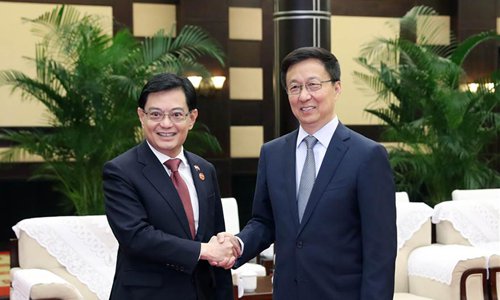HOME >> OPINION
China-Singapore relations eye new vistas after several agreements are signed
Source:Global Times Published: 2019/10/22 19:48:41

Chinese Vice Premier Han Zheng, also a member of the Standing Committee of the Political Bureau of the Communist Party of China Central Committee, meets with Singaporean Deputy Prime Minister Heng Swee Keat in Southwest China's Chongqing, October 15. Photo: Xinhua
Singapore and China signed a slew of agreements during the visit of Singapore Deputy Prime Minister and Finance Minister Heng Swee Keat who as the head of a heavyweight delegation to the country visited Chongqing, Tianjin and Beijing from October 14 to 17. During his trip, Heng said the friendship between the two countries had deepened amid extensive cooperation and Singapore was ready to work with China to elevate bilateral relations to a higher level.
In Chongqing, Chinese Vice Premier Han Zheng and Heng co-chaired the 15th China-Singapore Joint Council for Bilateral Cooperation as well as another three meetings for inter-governmental projects. The two sides agreed on many areas and signed various deals on finance, education and smart city development.
Members of Heng's delegation have drawn public attention. The delegation included six full ministers, two senior ministers of state and one minister of state, who are from the fourth-generation leadership team. This heavyweight delegation showed that the new generation of Singaporean leaders values China-Singapore relations. As Heng said, he hoped this visit could "pave the way for the next generation of leaders to strengthen our bilateral relationship."
The number of Singaporean fourth-generation ministers in the delegation showed the intention of continuing cordial ties with China. To be specific, China-Singapore ties in the new era will deepen along the following aspects.
First, economic and trade connectivity is still the bedrock of China-Singapore relations. Since the establishment of diplomatic ties in 1990, China and Singapore have made plenty fruits in areas such as trade and investment. The two sides have promoted updates on the three inter-governmental projects: the Suzhou Industrial Park, Tianjin Eco-city and Chongqing Connectivity Initiative. These projects play a leading role in enhancing economic and trade cooperation, upgrading production capacity and economic structure, as well as developing new technologies. Since 2013, China has been Singapore's largest trading partner, and Singapore has been China's largest foreign investor. On October 16, the upgraded version of the China-Singapore Free Trade Agreement has taken effect. It will not only strengthen the foundation of trade and investment between the two countries, but also highlight the deep consensus in promoting bilateral and global free trade in the new era.
Second, policy communication and mutual political trust are driving forces for China-Singapore relations. The year 2020 will witness the 30th anniversary of the establishment of diplomatic relations between the two countries. Through this visit, the city state expects to consolidate the friendship between its fourth-generation leaders and senior Chinese leaders. As the most likely candidate to be next prime minister, Heng said during his visit that "As we embark on our next phase of cooperation, I look forward to seeing Singapore continue to partner China in the development of both countries... while ensuring this will in turn benefit our people and businesses." Heng's remarks were based on Singapore's own national interest.
He also pointed out that Singapore must study how to play different roles in various stages of other countries' development when building diplomatic relations. Currently, maintaining policy communication and building mutual political trust with China are undoubtedly a favorable choice for Singapore to safeguard and expand its interests.
Third, people-to-people exchanges are a bond for China-Singapore relations. The two countries will hold an exchange program since 2020 to annually send 500 students to one the other for internships. This is the first bilateral internship exchange program Singapore has ever signed with a foreign country. The program will help the youth have a deeper understanding of the politics, economy, society and culture of the two countries.
Singapore is unique to China. Both countries value their cooperation in various fields, which have brought brilliant future for their bilateral relations. As Vice Premier Han said, "China's door of opening-up will not be closed, but will only open wider." China welcomes Singapore to play a bigger role within its reform and opening-up process. In the meantime, Singapore hopes to strengthen constructive cooperation with China based on win-win mode and upgrade relations with China. Such being the case, the two countries will have an increasingly mutually beneficial relationship.
The author is director of The Center for Singapore Studies at Shandong University of Political Science and Law and a research fellow of The Charhar Institute. opinion@globaltimes.com.cn
RELATED ARTICLES:
Posted in: VIEWPOINT